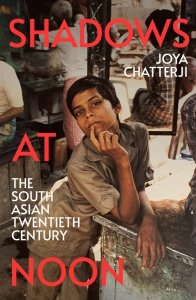Congratulations to Prof Joya Chatterji
Our congratulations to RAS member Professor Joya Chatterji on being awarded the 2024 Wolfson History Prize for her book Shadows at Noon: The South Asian Twentieth Century.

The Wolfson History Prize is given annually to celebrates history books which combine excellence in research with readability. Joya Chatterji’s book, which tells the South Asian story from the British Raj to independence and partition and on to the forging of the modern nations of India, Pakistan and Bangladesh, is structured thematically rather than chronologically. More details about the book and the prize can be found on the Wolfson History Prize website.
Our Vice President Dr Gordon Johnson wrote a blog post about the book shortly after its publication:
Professor Chatterji’s new book, Shadows at Noon: The South Asian Twentieth Century is a triumphant attempt to present the complex history of modern south Asia to a wide readership. Written from a personal point of view, Professor Chatterji has not only drawn on a wide range of archival sources and extensive other reading but she has taken part in oral history projects and has herself observed the evolution of contemporary south Asian politics from close quarters. This makes her book particularly interesting – almost source material in itself. That it is so compellingly written – spiced with irony and self-deprecatory asides, a style that many English and Bengali writers have honed to a fine degree – is a real bonus for the general reader.
The first half of the book gives as good a narrative of the trajectory of Indian nationalisms as can be found in any of the existing literature. It puts centre stage not the formal tussle between monolithic imperialism and nationalism that has been the obvious framework for general histories of this kind, but analyses rather the challenges faced by all politicians in dealing with social, economic, and cultural interactions in South Asia, the resolution of which lie at the heart of any successful society. This has the advantage, without in any way diminishing the significance of decolonisation in 1947 and the consequent mass migrations and sufferings of partitions, of focussing on the powerful underlying and often intractable issues that drive politics in the sub-continent. It begins to explain the failures of the British as they lost legitimacy (but not their capacity for flourishes of violence) and denied them initiative in policy-making. It begins to explain the success of the Congress and others in creating alternative politics – but also reveals the constraints under which they laboured in turn and shows up the constant shifts and reversals they and their successors continue to face. At the heart of south Asian politics lies the question: how to create a polity or polities that can satisfy so diverse a population occupying a huge land mass that does not fit into easily definable geographical political units. Emerging out of this analysis comes a more credible argument for continuity and seeing shared, rather than divisive, experiences.
The second half of the book brings a new take to this perspective by looking at migrations (both at home and abroad), family organisations, what people eat and how it effects their health and well-being, a new look at caste, and how through leisure (especially the cinema), south Asians are constantly rethinking who they are and what implications this has for the perpetually shifting political play.
Shadows at Noon is an unusual and stimulating read. The shadows cast over the subcontinent are deep, even at noon; but the story is not unduly pessimistic either. It asks intriguing and interesting questions and probes deeply at possible answers. Its rational scepticism, informed by such thorough and wide-reaching research, driven by such a personal quest for identity, is refreshing. And the page-turning quality of the prose marks a significant step forward in understanding south Asia and its place in a contemporary global setting.
